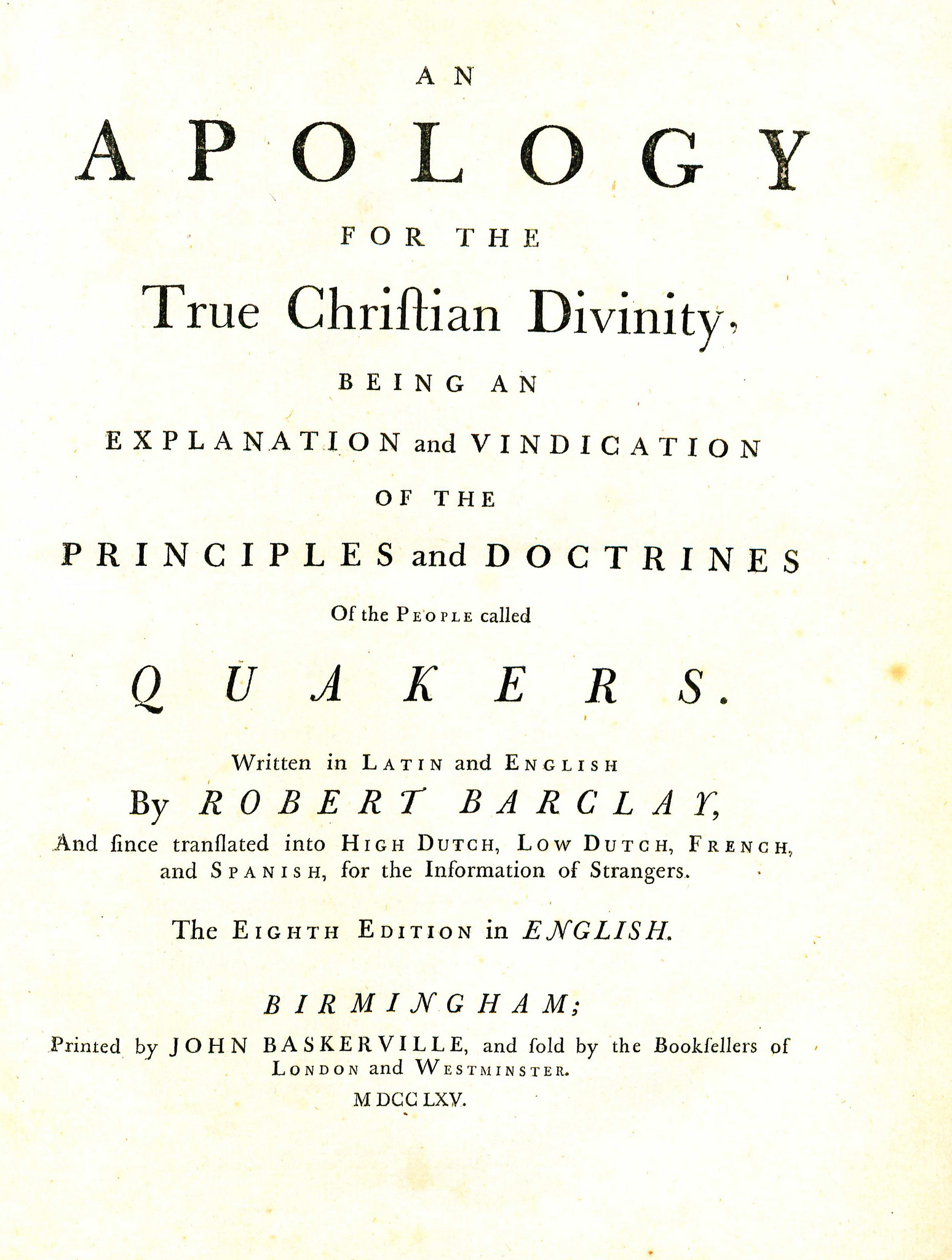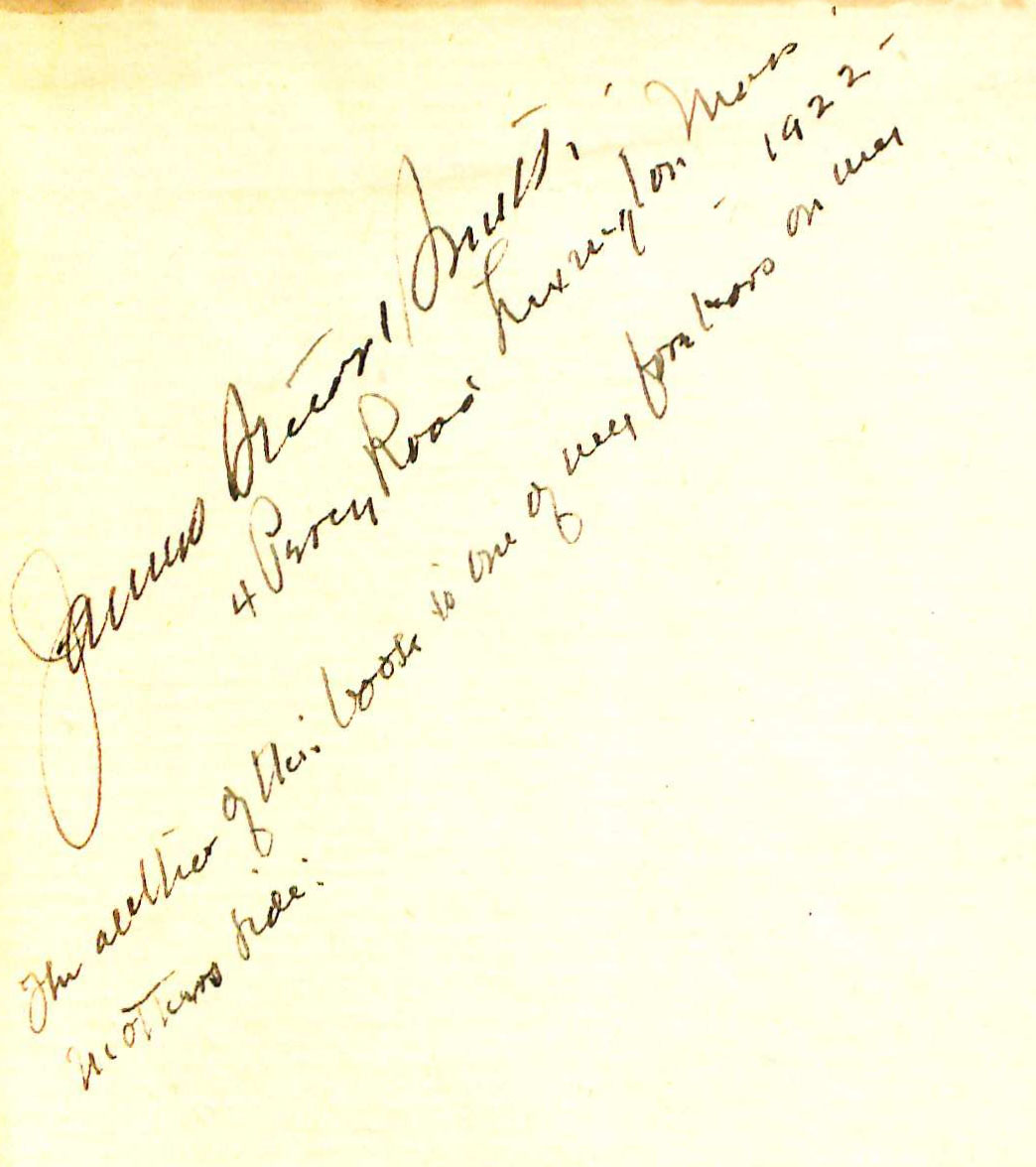Difference between revisions of "Apology for the True Christian Divinity"
m |
m |
||
| Line 15: | Line 15: | ||
|year=1765 | |year=1765 | ||
|pages=[12], [II]-XIII, [2], 504, [16] pages | |pages=[12], [II]-XIII, [2], 504, [16] pages | ||
| − | |shelf= | + | |shelf=B-5 |
}}[http://en.wikipedia.org/wiki/Robert_Barclay Robert Barclay] (1648 – 1690), an early convert to Quakerism,<ref>Gordon DesBrisay, "[http://www.oxforddnb.com/view/article/1347 Barclay, Robert, of Ury (1648–1690)]" in ''Oxford Dictionary of National Biography'' (Oxford University Press, 2004- ), accessed October 2, 2013.</ref> spent most of his life’s work spreading and defending those beliefs. His work did not come without a price—he was imprisoned numerous times.<ref>''Encyclopædia Britannica Online'', s. v. "[http://www.britannica.com/EBchecked/topic/53083/Robert-Barclay Robert Barclay]," accessed October 02, 2013.</ref> His ''An Apology for the True Christian Divinity: Being an Explanation and Vindication of the Principles and Doctrines of the People called Quakers'' is the definitive statement and defense of Quakerism.<ref>Ibid.</ref> Barclay’s theological background allowed him to articulate and defend it in terms that non-Quakers could understand.<ref>Robert Barclay, ''An Apology for the True Christian Divinity'', ed. Licia Kuenning (Farmington: 2002), iii.</ref> Barclay first wrote and published ''Apology'' in Latin in 1676; he later translated and republished it in English in 1678.<ref>Ibid.</ref> ''Apology'' has been described as "one of the most impressive theological writings of the [seventeenth] century ... It is impressive in style; grave, logical, and often marked by the eloquence of lofty moral convictions."<ref>"Barclay, Robert," in ''Oxford Dictionary of National Biography'', ed. Leslie Stephen (New York: Macmillan and Co., 1885), 169.</ref> Beyond this significant contribution to Quakerism, Barclay was also the Governor of East Jersey, now part of the State of New Jersey, from 1682 to 1688.<ref>Encyclopædia Britannica Online, s. v. "Robert Barclay."</ref> | }}[http://en.wikipedia.org/wiki/Robert_Barclay Robert Barclay] (1648 – 1690), an early convert to Quakerism,<ref>Gordon DesBrisay, "[http://www.oxforddnb.com/view/article/1347 Barclay, Robert, of Ury (1648–1690)]" in ''Oxford Dictionary of National Biography'' (Oxford University Press, 2004- ), accessed October 2, 2013.</ref> spent most of his life’s work spreading and defending those beliefs. His work did not come without a price—he was imprisoned numerous times.<ref>''Encyclopædia Britannica Online'', s. v. "[http://www.britannica.com/EBchecked/topic/53083/Robert-Barclay Robert Barclay]," accessed October 02, 2013.</ref> His ''An Apology for the True Christian Divinity: Being an Explanation and Vindication of the Principles and Doctrines of the People called Quakers'' is the definitive statement and defense of Quakerism.<ref>Ibid.</ref> Barclay’s theological background allowed him to articulate and defend it in terms that non-Quakers could understand.<ref>Robert Barclay, ''An Apology for the True Christian Divinity'', ed. Licia Kuenning (Farmington: 2002), iii.</ref> Barclay first wrote and published ''Apology'' in Latin in 1676; he later translated and republished it in English in 1678.<ref>Ibid.</ref> ''Apology'' has been described as "one of the most impressive theological writings of the [seventeenth] century ... It is impressive in style; grave, logical, and often marked by the eloquence of lofty moral convictions."<ref>"Barclay, Robert," in ''Oxford Dictionary of National Biography'', ed. Leslie Stephen (New York: Macmillan and Co., 1885), 169.</ref> Beyond this significant contribution to Quakerism, Barclay was also the Governor of East Jersey, now part of the State of New Jersey, from 1682 to 1688.<ref>Encyclopædia Britannica Online, s. v. "Robert Barclay."</ref> | ||
{{BookPageInscription | {{BookPageInscription | ||
Latest revision as of 15:38, 29 March 2023
by Robert Barclay
| An Apology for the True Christian Divinity | |
|
Title page from An Apology for the True Christian Divinity, George Wythe Collection, Wolf Law Library, College of William & Mary. | |
| Author | Robert Barclay |
| Published | Birmingham: Printed by John Baskerville |
| Date | 1765 |
| Edition | Eighth edition in English |
| Language | English |
| Pages | [12], [II]-XIII, [2], 504, [16] pages |
| Location | Shelf B-5 |
Robert Barclay (1648 – 1690), an early convert to Quakerism,[1] spent most of his life’s work spreading and defending those beliefs. His work did not come without a price—he was imprisoned numerous times.[2] His An Apology for the True Christian Divinity: Being an Explanation and Vindication of the Principles and Doctrines of the People called Quakers is the definitive statement and defense of Quakerism.[3] Barclay’s theological background allowed him to articulate and defend it in terms that non-Quakers could understand.[4] Barclay first wrote and published Apology in Latin in 1676; he later translated and republished it in English in 1678.[5] Apology has been described as "one of the most impressive theological writings of the [seventeenth] century ... It is impressive in style; grave, logical, and often marked by the eloquence of lofty moral convictions."[6] Beyond this significant contribution to Quakerism, Barclay was also the Governor of East Jersey, now part of the State of New Jersey, from 1682 to 1688.[7]
Evidence for Inclusion in Wythe's Library
Thomas Jefferson sold the Library of Congress a copy of the 1765 (8th English) edition of this title. The Library still owns this copy which contains "numerous corrections in ink ... [which] appear to be in the handwriting of George Wythe."[8] Three of the Wythe Collection sources (Dean's Memo,[9], Brown's Bibliography[10] and George Wythe's Library[11] on LibraryThing) list the title based on Millicent Sowerby's attribution of the corrections to Wythe. Barclay's Apology is not listed in the Jefferson Inventory of Wythe's Library. Perhaps this was an oversight on Jefferson's part, or the title appeared on a lost or damaged page.
Description of the Wolf Law Library's copy
Bound in contemporary calf and very neatly re-backed in matching leather with gilt-decorated spine. Front pastedown includes the inscription "James Dricorl Druis (?), 4 Percy Road Lexington, Mass., - 1922 -, The author of this book is one of my forebears on my mother's side." Purchased from Argosy Book Store.
Images of the library's copy of this book are available on Flickr. View the record for this book in William & Mary's online catalog.
Full text
See also
References
- ↑ Gordon DesBrisay, "Barclay, Robert, of Ury (1648–1690)" in Oxford Dictionary of National Biography (Oxford University Press, 2004- ), accessed October 2, 2013.
- ↑ Encyclopædia Britannica Online, s. v. "Robert Barclay," accessed October 02, 2013.
- ↑ Ibid.
- ↑ Robert Barclay, An Apology for the True Christian Divinity, ed. Licia Kuenning (Farmington: 2002), iii.
- ↑ Ibid.
- ↑ "Barclay, Robert," in Oxford Dictionary of National Biography, ed. Leslie Stephen (New York: Macmillan and Co., 1885), 169.
- ↑ Encyclopædia Britannica Online, s. v. "Robert Barclay."
- ↑ E. Millicent Sowerby, Catalogue of the Library of Thomas Jefferson, (Washington, D.C.: The Library of Congress, 1952-1959), 2:126 [no.1537].
- ↑ Memorandum from Barbara C. Dean, Colonial Williamsburg Found., to Mrs. Stiverson, Colonial Williamsburg Found. (June 16, 1975), 2 (on file at Wolf Law Library, College of William & Mary).
- ↑ Bennie Brown, "The Library of George Wythe of Williamsburg and Richmond," (unpublished manuscript, May, 2012) Microsoft Word file. Earlier edition available at: https://digitalarchive.wm.edu/handle/10288/13433
- ↑ LibraryThing, s. v. "Member: George Wythe", accessed on February 4, 2013.
External Links
Read this book in Google Books.

